Far From the Farm
Experiential learning enriches student understanding and achievement
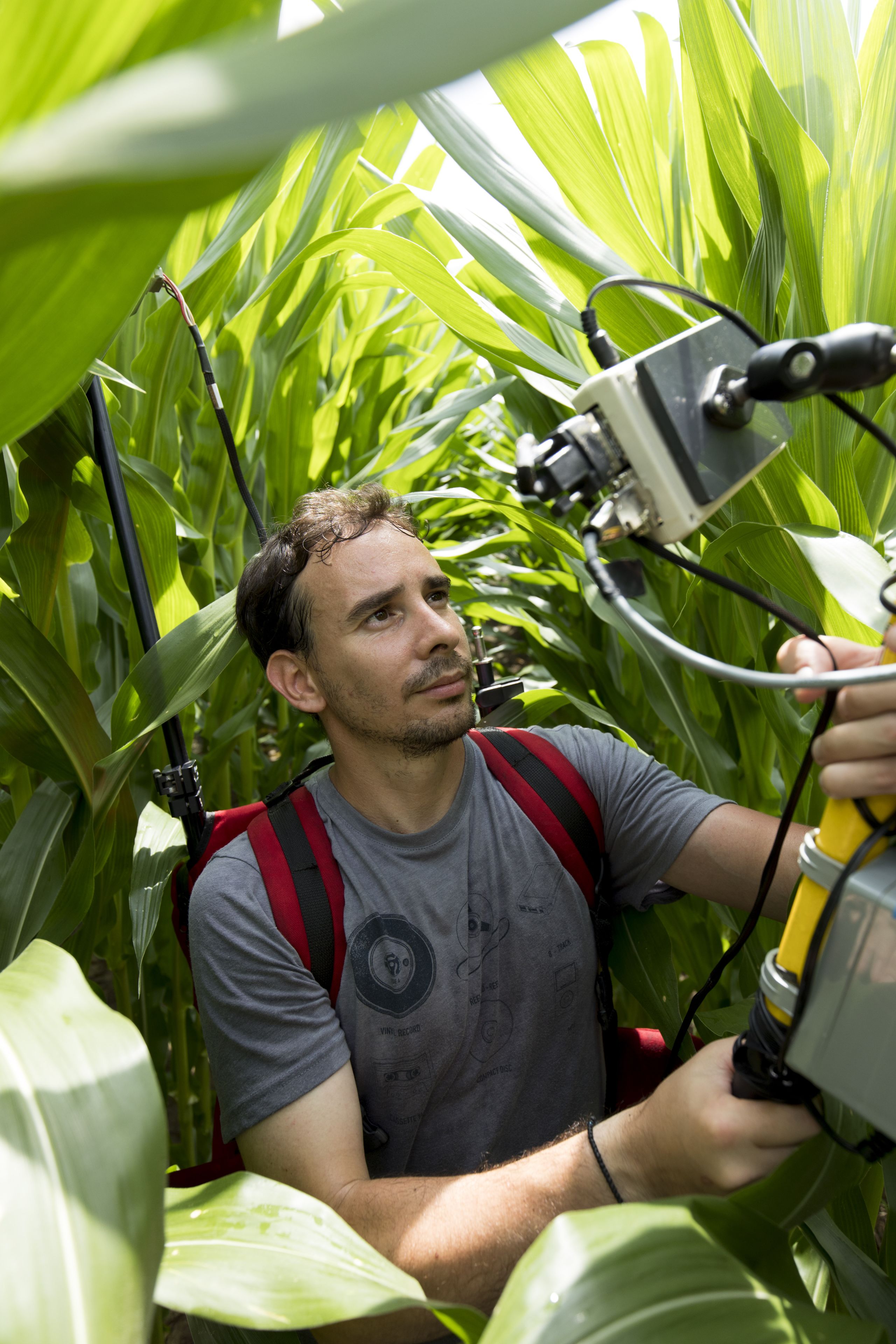
Influence on our
STUDENTS
FACT: The CAES Deans’ Promise initiative ensures that every CAES student will have the opportunity to enrich their college experience beyond the classroom through internships, research, service-learning and study abroad programs.
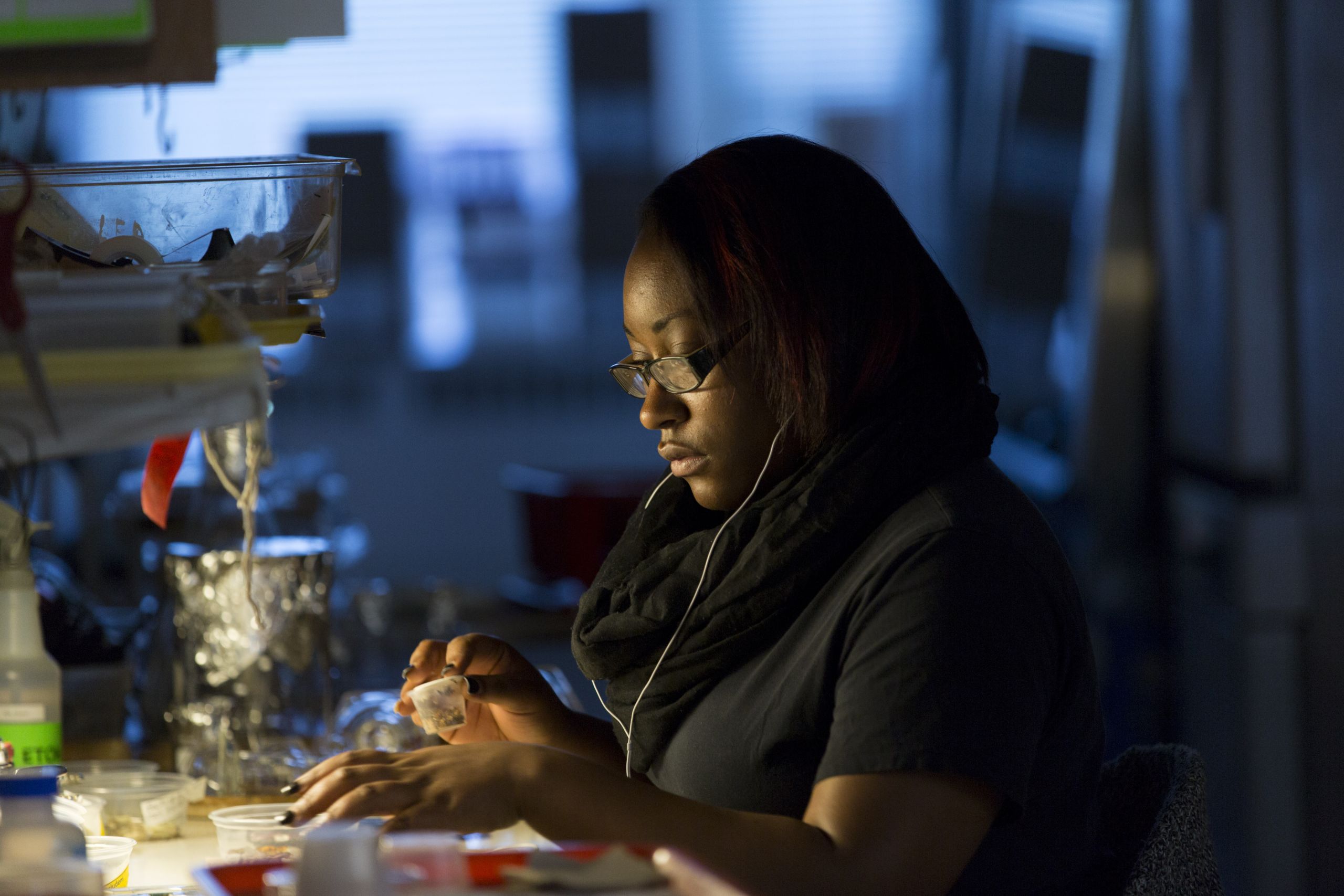
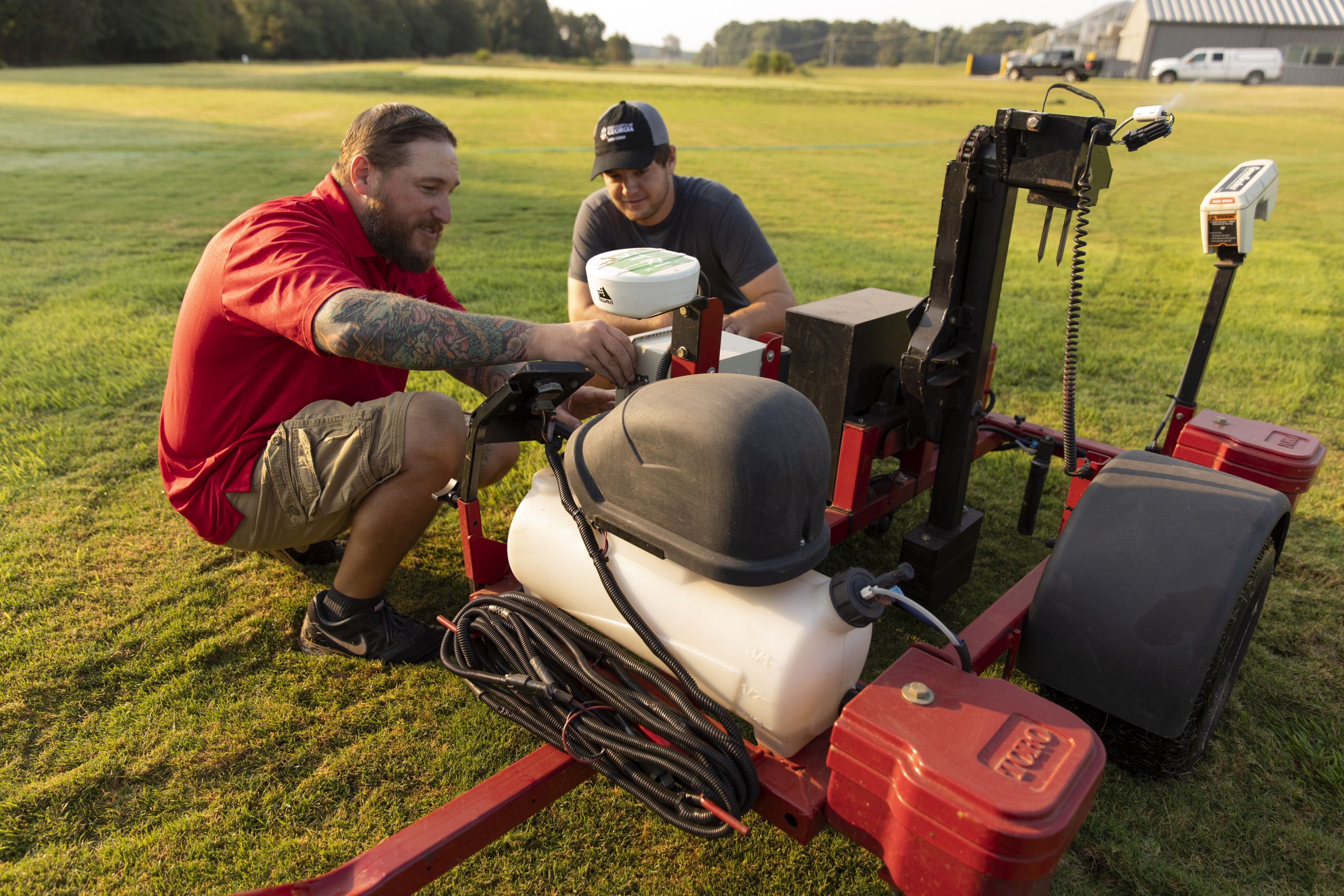
Gerald Henry, UGA Athletics Board Endowed Professor of Environmental Turfgrass Management, shows a student a sensor that monitors athletic field conditions, part of his ongoing research on athlete and environmental impact. His comprehensive research and industry connections are immensely helpful in student learning.
Gerald Henry, UGA Athletics Board Endowed Professor of Environmental Turfgrass Management, shows a student a sensor that monitors athletic field conditions, part of his ongoing research on athlete and environmental impact. His comprehensive research and industry connections are immensely helpful in student learning.
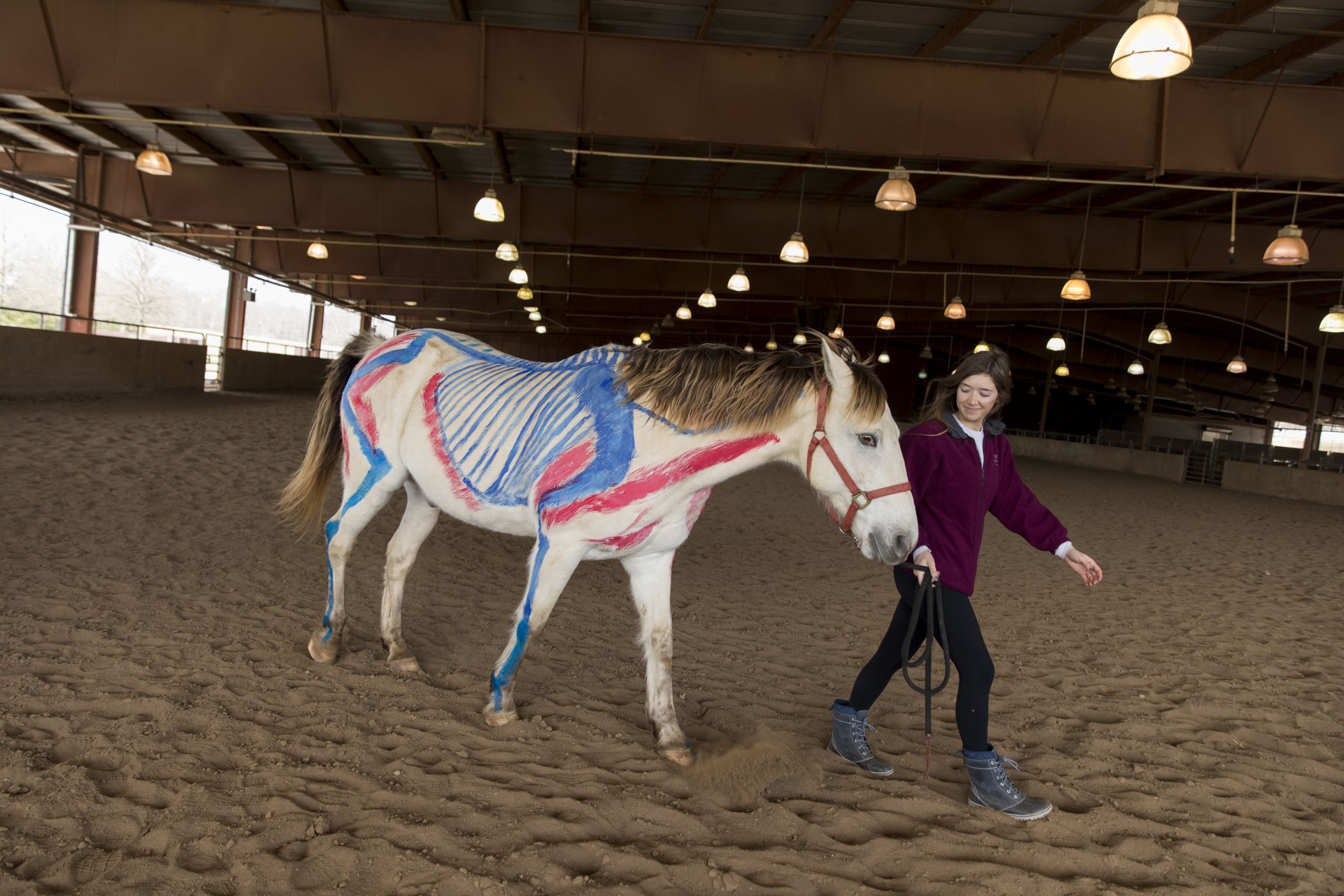
Undergraduate student Claire Hiller paints with a horse during a horse anatomy painting lab class. The experiential learning requirement allows students to gain real world experience, broaden their horizons and become more marketable to employers through several curricular options.
Undergraduate student Claire Hiller paints with a horse during a horse anatomy painting lab class. The experiential learning requirement allows students to gain real world experience, broaden their horizons and become more marketable to employers through several curricular options.
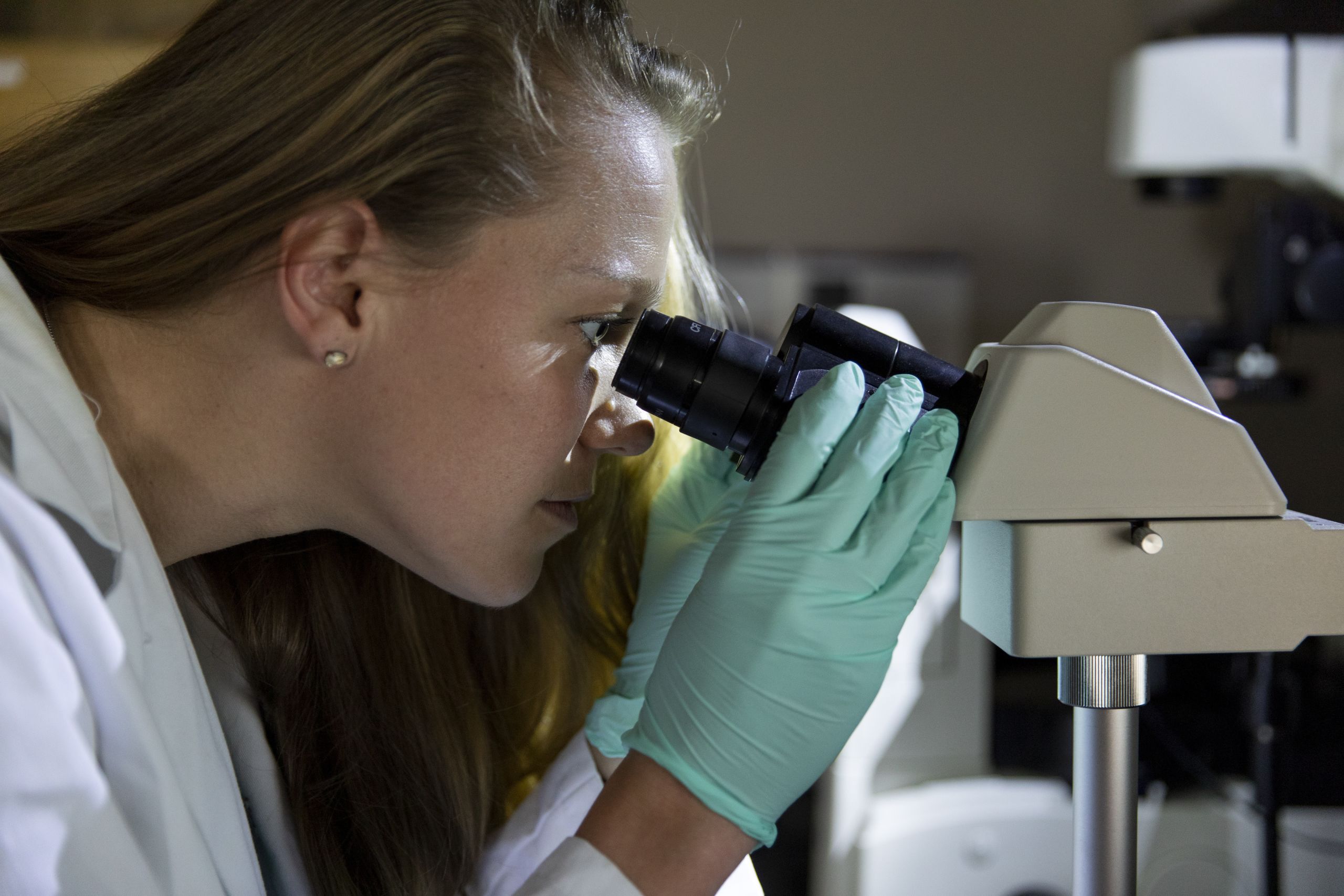
The CAES Undergraduate Research Initiative allows students the opportunity to conduct research under the direction of a CAES faculty member, giving them hands-on research experience at an undergraduate level.
The CAES Undergraduate Research Initiative allows students the opportunity to conduct research under the direction of a CAES faculty member, giving them hands-on research experience at an undergraduate level.
Knowing she will apply to medical schools, junior biological science major Amelia Payne hopes her undergraduate experience at the College of Agricultural and Environmental Sciences will distinguish her from the pack.
In addition to the traditional biology, chemistry and physics classes common to pre-med majors, Payne will have classes like herbs, spices and medicinal plants; food science and technology; and reproductive endocrinology on her transcript. Her college activities will include study abroad trips to Costa Rica and Scotland to study coffee production and youth in agriculture and a medicinal herbs internship at UGArden, the college’s student-run community farm.
“I’ve expanded my degree beyond the traditional biology major. I hope they will see I have been able to balance my course load with study abroad opportunities, my job working with freshmen as a resident assistant, being a student ambassador, and working as a medicinal herbs intern at the farm. That will show that I will be able to handle the stress and workload of being a medical school student and that CAES provided those opportunities for me,” said Payne, whose goal is to become a pediatric oncologist and cancer researcher.
The breadth of majors available at CAES often comes as a surprise to students who hear about the college through their peers, a recruiter, or while exploring options when deciding on or changing a major.
“The biggest challenge we have is the name of the college and overcoming the misperceptions people have of agriculture or horticulture or agronomy. We are so much more than ‘just agriculture.’ We have changed, but the perceptions have not changed,” said Doug Bailey, assistant dean for academic affairs and former head of the Department of Horticulture at CAES. “We’re not necessarily changing what these students want to do, but letting them know that they can accomplish their goals here.”
Renay Gregoire-Berger (BSA — Avian Biology, ’15) is an academic advisor in the CAES Office of Academic Affairs. While many of her advisees are biological science majors, she also advises students with unspecified majors.
“We have a lot of students from cities who don’t relate to agriculture at all, but you don’t have to be raised on a farm to study agricultural economics or leadership. Most of our students in biological science are preprofessional students and, whether they are interested in medical school, veterinary school or dental school, they have to take the same exact science courses as other science majors in other colleges. The only difference in requirements is in elective courses,” Gregoire-Berger said.
Opportunities for undergraduate research and study abroad courses abound, and some classes are uniquely available to biological science students, she added.
“Our students are able to build a degree that is more hands-on or more focused toward their particular goals. Our students have access to courses — such as surgical techniques in our poultry science department — that aren’t available anywhere else on campus,” Gregoire-Berger said.
A strong student focus and the availability of academic advisors who can help students understand the breadth of majors available in CAES is one benefit the college offers over other academic units that may have a substantially larger student population, Bailey said.
For Ben Byrd (BSA — Horticulture ’17), the diversity of majors and program offerings in the college sold him on choosing to pursue an agriculture degree.
“I felt like no matter where I turned there was something I could do as a career,” he said. “There’s really no wrong way you could go in CAES. It just comes up to you picking your route.”
While studying horticulture, Byrd spent time as a farm intern at UGArden, leading Clarke County students on tours and working in the fields. “It improved my overall understanding of horticulture exponentially,” he said.
Service-learning allowed him to better connect with the local community and with the diverse workforce in the local green industry. In a class coordinated by faculty in the Department of Horticulture and the Latin American and Caribbean Studies Institute, students learned key, content-specific Spanish phrases commonly used by green industry employees and gained perspective on diversity and cross-cultural values.
While working at a plant nursery after graduation, Byrd embraced his affinity for teaching people about plants, so he set his sights on graduate school. He is currently pursuing a master’s degree in agricultural and environmental education at CAES.
As a teaching assistant for Project FOCUS (Fostering Our Community’s Understanding of Science) — a service-learning course organized by agricultural education professor Jason Peake — Byrd is helping current CAES undergraduate students develop educational content.
The class has connected UGA student-scientists to local schools for nearly two decades to promote STEM education and give UGA students hands-on experience so they can decide if teaching might be a good fit as a career. “You may have students in the hard sciences who are future educators, but they don’t know it yet,” Byrd said.
Opportunities to learn aren’t limited to CAES students.
Kari Turner, an associate professor of equine science, has to stay up-to-date with the latest information through her research and industry connections, which are integral to the land-grant mission.
“Talking to people in the industry helps to identify current issues affecting them, so I know where to direct my teaching and research to address those issues,” Turner said. “I think it helps provide real-life application and strengthen my teaching because I have experiences to back up what I am saying.”
The connections she makes, in turn, help with teaching opportunities. Each September, she takes a class to Kentucky to visit farms, veterinary clinics, feed mills, race tracks and sales facilities that are a part of the equine industry.
Caroline Hinton (BSA – Animal Science, ’19; BSA – Agricultural Communications, ‘19) valued the research opportunities she had as an undergraduate studying horse production and management with Turner.
“UGA does a good job of providing a great classroom education, but also experiences to connect you to the outside,” Hinton said.
Outside the classroom for Hinton meant a study abroad program in Uruguay on beef production; getting involved with clubs and events like the Great Southland Stampede Rodeo committee; and a culture-centered communication-service class at the Jackson County Food Bank.
“Instead of just working with people similar to me, it made me understand different people’s viewpoints,” Hinton said. “It was much more applicable, and I could see what I was learning. I could really see a change in myself from the beginning of the class to the end.”
Byrd and Hinton agree that close connections with CAES faculty have been integral to their success.
“When you’re doing extracurriculars and going to faculty with questions, you get to know their life and they get to know yours — you get to build a connection with them,” said Hinton. “Your true knowledge and education doesn’t come from a textbook. It comes from your experiences and opportunities to meet people who make lasting impressions on your education.”
